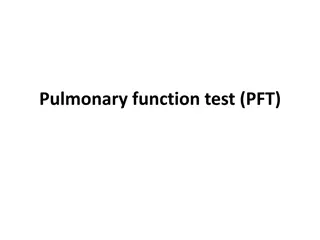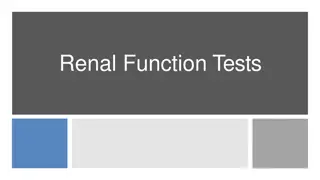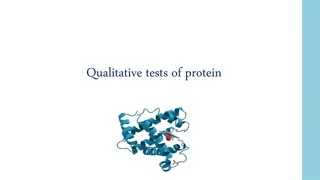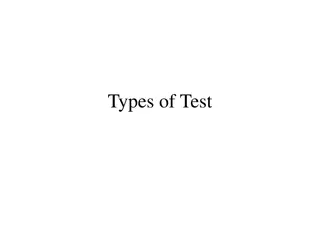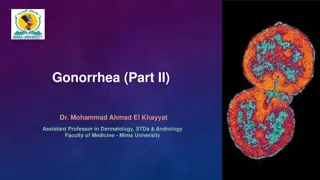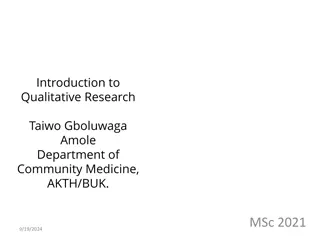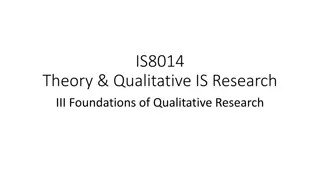Construction of an Achievement Test
Learn about achievement tests, standardized tests, oral tests, essay tests, and more for student evaluation. This guide discusses various types of tests and their purposes in assessing student learning. Enhance your understanding of educational assessment methods with this comprehensive resource
0 views • 29 slides
Understanding Quantitative and Qualitative Research Methods
Exploring the differences between quantitative and qualitative research methods, this content delves into the importance of qualitative research, various methodologies such as focus groups and interviews, data collection, research ethics, and analysis techniques. It also covers the elements of the r
4 views • 43 slides
Understanding Qualitative Research: Foundations and Orientations
Explore the foundations of qualitative research and orientations to meaning in Big Q qualitative methods. Delve into the values, characteristics, and theoretical underpinnings of qualitative inquiry, and reflect on the significance of meaning-making in research. Consider the role of subjectivity in
0 views • 23 slides
Understanding the Case Study Method: In-depth Qualitative Analysis
The case study method is a popular form of qualitative analysis involving intensive observation of a social unit. It focuses on detailed analysis of a limited number of events or conditions to understand complex interrelationships. Characteristics include intensive study of a single unit, qualitativ
1 views • 8 slides
Comprehensive Overview of Pulmonary Function Tests (PFTs)
Pulmonary Function Tests (PFTs) are vital for assessing pulmonary gas exchange through ventilation, diffusion, and lung perfusion. These tests include measurements of lung volume, airway patency, gas exchange efficacy, and pulmonary blood flow. PFTs offer benefits in diagnosing dyspnea, monitoring d
0 views • 14 slides
Understanding Verbal and Non-Verbal Tests
Verbal and non-verbal tests serve different purposes in assessing intelligence and skills. Non-verbal tests utilize images and diagrams to measure reasoning abilities without requiring reading or writing. Verbal tests, on the other hand, assess language-based skills through reading, writing, or oral
0 views • 14 slides
Enhancing Natural Experiment Research Through Qualitative Work
Qualitative research plays a crucial role in enhancing natural experiment studies by providing insights into the processes of exposure to interventions, identifying variables influencing exposure likelihood, and determining suitable control groups. Complementary methods within the RE-AIM framework a
0 views • 13 slides
Understanding Renal Function Tests and Kidney Health
Renal function tests are essential for diagnosing and monitoring kidney health. These tests assess functions like glomerular filtration, tubular reabsorption, and endocrine functions of the kidneys. Common indicators include serum urea, creatinine levels, and more. It's crucial to evaluate renal fun
0 views • 34 slides
Understanding Different Types of T-Tests in Psychological Research
This article provides an overview of different types of t-tests used in psychological research, including independent t-tests for comparing two groups, paired or correlated t-tests for within-group comparisons, and the assumptions behind conducting these tests. It also includes examples of when to u
1 views • 7 slides
Protein Qualitative Tests and Precipitation Methods
Qualitative tests of proteins involve reactions producing colored products, such as the Biuret test specifically detecting peptide bonds. Protein precipitation methods are used for concentration and purification, affected by factors like pH, temperature, salts, and heavy metals. Different techniques
1 views • 17 slides
Qualitative Data Analysis Techniques in Research
The purpose of data analysis is to organize, structure, and derive meaning from research data. Qualitative analysis involves insight, creativity, and hard work. Researchers play a crucial role as instruments for data analysis, exploring and reflecting on interview discussions. Steps include transcri
1 views • 27 slides
Understanding Non-Parametric Tests and Their Applications
Non-parametric tests serve as valuable alternatives to parametric tests when data do not meet specific criteria. This article explores the concept of non-parametric tests, types of non-parametric tests, and provides insights on conducting the Mann-Whitney U Test using SPSS for practical research app
4 views • 32 slides
Understanding Experiential vs. Critical Qualitative Research
Delve into the foundations of qualitative research with a focus on experiential and critical approaches. Explore key concepts, defining characteristics, and theoretical foundations, distinguishing between qualitative and quantitative research. Reflect on different orientations, subjectivity, and ref
0 views • 16 slides
Understanding Types of Test and Evaluation in Education
Explore the various types of tests used in education, including pre-tests, mastery tests, and diagnostic tests. Learn about different mediums for testing, such as oral, written, and performance tests. Discover the role of examinees in essay-type and objective-type tests. Lastly, delve into different
1 views • 13 slides
Understanding Achievement and Aptitude Tests in Education
Explore the differences between achievement and aptitude tests, such as how they measure abilities and knowledge. Learn about teacher-made tests, standardized tests, low-stake, and high-stake tests. Discover the importance of achievement tests in evaluating present proficiency and aptitude tests in
1 views • 16 slides
Gonorrhea Diagnostic Methods and Tests Overview
Dr. Mohammad Ahmad El Khayyat, an Assistant Professor in Dermatology, STDs, and Andrology, details the diagnostic methods and tests for gonorrhea. Various tests including Gram stain, culture, antigen detection tests, and nucleic acid amplification tests are discussed, highlighting sensitivity and sp
1 views • 30 slides
Exploring Key Characteristics of Qualitative Research in Psychology
The lecture series delves into the values, characteristics, and theoretical foundations of qualitative research, emphasizing the differences from quantitative methods. It explores experiential and critical qualitative camps, subjectivity, reflexivity, and ontological and epistemological foundations.
4 views • 18 slides
Understanding Achievement Tests in Education
Achievement tests play a crucial role in assessing student progress in schools, aiding curriculum planning, and evaluating teaching programs. These tests measure individual accomplishments after a period of learning, helping to determine the effectiveness of instruction. Characteristics such as reli
2 views • 30 slides
Contrasting Qualitative and Quantitative Traits in Genetics
Genetic traits in organisms can be qualitative or quantitative, with qualitative traits controlled by single genes and showing distinct variations, while quantitative traits are influenced by multiple genes and environmental factors, resulting in continuous variations. Qualitative genetics focuses o
0 views • 13 slides
Integrated Language Tests and Assessments Overview
This content delves into integrated language tests and assessments, exploring the differences between separate skills tests and integrated tests. It covers the rationale behind integrating language skills, examples of integrated skills tests, as well as shortcomings to avoid in test design. Key aspe
1 views • 35 slides
Understanding Amino Acids: Qualitative Tests and Properties
Amino acids play a crucial role as building blocks of proteins and can be converted into specialized products. There are 20 common L-α-amino acids found in mammalian proteins, each with a unique structure and classification based on their side chain properties. Amino acids exhibit optical activity,
1 views • 34 slides
Qualitative Analysis of Aldehydes and Ketones in Chemistry Lab
In this Chemistry 318 lab, students will conduct qualitative analysis of aldehydes and ketones using chemical and spectroscopic methods. The lab includes classification tests, spectroscopy (IR, 1H-NMR/13C-NMR, MS), and identification of unknown compounds. Experimental procedures involve physical eva
1 views • 11 slides
Quality Control Tests for Pharmaceutical Packaging Materials
This article discusses quality control tests for pharmaceutical packaging materials focusing on glass containers. The tests include chemical resistant tests such as powdered glass test and water attack test, as well as hydrolytic resistance tests. Detailed procedures for each test are outlined along
3 views • 18 slides
Understanding Quantitative Genetics Principles in Animal Breeding
Quantitative genetics focuses on the inheritance of characteristics based on degree rather than kind, compared to qualitative genetics. It involves polygenes controlling quantitative traits, which exhibit continuous variation and can be measured using metric units. Qualitative traits, on the other h
0 views • 22 slides
Qualitative Analysis of Cations in Chemistry Experiments
Explore the qualitative analysis of cations such as calcium, aluminum, zinc, and lead through various tests with reagents like sodium hydroxide and ammonia. Learn how to observe and distinguish different cations based on their distinct reactions and characteristics in solution. The tests provide ins
0 views • 18 slides
Understanding Qualitative Methodology: An Overview
This presentation delves into the realm of qualitative methodology, exploring its purpose, characteristics, approaches, data collection methods, analysis, and learning outcomes. It aims to provide a deep understanding of how qualitative research illuminates voices and experiences, distinguishes betw
0 views • 41 slides
Qualitative Approaches in a Data-Intensive World
Qualitative research involves studying perceptions, experiences, and behaviors through verbal or visual expressions. In a data-intensive world, online communication plays a crucial role in data collection. Qualitative eResearch utilizes Information and Communication Technologies (ICTs) strategically
0 views • 10 slides
Meaning and Meaning-making in Big Q Qualitative Research
Qualitative research explores different understandings of meaning and meaning-making, providing researchers with tools, techniques, and values. Big Q qualitative research focuses on the active role of words in creating meaning beyond reflecting experiences. This lecture series delves into the founda
1 views • 20 slides
Understanding Research Methods in Public Health
Exploring the nuances of qualitative and quantitative research methods in the context of public health, this content delves into how each approach offers unique insights and perspectives. It discusses the importance of qualitative research in uncovering underlying factors influencing health, interpr
0 views • 77 slides
Qualitative Tests of Proteins & Amino Acids: Overview and Analysis
In this lab, you will delve into the qualitative tests for proteins and amino acids, understanding their structures, classifications, and importance in food and human nutrition. The tests include solubility tests and identification tests for both amino acids and proteins, revealing their presence an
0 views • 13 slides
Qualitative Tests of Proteins & Amino Acids - Lab Analysis Overview
This lab analysis covers qualitative tests for proteins and amino acids, including solubility tests and identification tests for amino acids and proteins. Specific tests like Ninhydrin test for -L amino acids, Xanthoproteic test for aromatic amino acids, and lead sulfite test for sulfhydryl group de
0 views • 13 slides
Sensory Analysis Tests in Food Evaluation
Explore different sensory analysis tests used in food evaluation, including paired comparison tests for sweetness, quantitative descriptive analysis for taste attributes, and affective tests like hedonic tests. Understand the purpose and methodology of each test to enhance product development and qu
0 views • 12 slides
Understanding Qualitative Data in Counseling
Exploring the challenges and strategies in utilizing qualitative data in counseling, this discussion covers topics such as data collection, coding for meaning, and presenting qualitative evidence. The importance of qualitative data in improving counseling programs and student services is highlighted
0 views • 32 slides
DArT-2 Tests and Experiments Overview
The DArT-2 tests involve twin experiments - DArT-2 and DArT-Test, focusing on ensuring the performance of DArT-2 in studying underground argon. Various tests like electronic tests of the PDM and vacuum tests are conducted to guarantee proper operation. Challenges with vacuum sealing and solutions li
0 views • 8 slides
Understanding the Differences Between Objective and Projective Tests
Objective tests aim to maximize objectivity by providing structured response options, while projective tests delve into hidden emotions and conflicts through ambiguous stimuli. Pros of objective tests include standardization and reliability, but projective tests offer unique insights based on indivi
0 views • 10 slides
Foundations of Qualitative Research: Understanding Methods and Data
Qualitative research involves a mix of different methods drawing on qualitative data, with debates on the need for a sensitive approach for richer appreciation. Understanding qualitative data and context, along with various types of data such as interviews and user-generated content, is essential fo
0 views • 41 slides
Understanding Unit Testing in Software Engineering
Concept Software is a discipline comprising various code pieces. Testing these codes together is complex but vital in Software Engineering. The process includes early testing like unit tests, pairwise/multiple component testing, module testing, integration testing, user tests, alpha tests, beta test
1 views • 6 slides
Understanding Carbohydrates: Qualitative Tests and Classification
Carbohydrates serve as a crucial energy source and structural element in living organisms. This lab explores the qualitative tests and classification of carbohydrates, including monosaccharides, disaccharides, oligosaccharides, and polysaccharides. Learn about the properties and distinctions of diff
0 views • 13 slides
Qualitative Tests of Carbohydrates in Biochemistry Lab
The lab features qualitative tests for identifying different types of carbohydrates such as pentose and hexose monosaccharides. Tests include Bial's test to distinguish between sugar types, Seliwanoff's test for aldoses and ketoses differentiation, and Iodine test for polysaccharide detection. Each
0 views • 9 slides
Qualitative Tests of Lipids and Derived Lipids Overview
Qualitative tests of lipids distinguish between oil, neutral fat, saturated fatty acids, and unsaturated fatty acids using methods like the copper acetate test. Derived lipids include substances like cholesterol and fat-soluble vitamins that are either soluble in lipids or derived from lipids throug
0 views • 14 slides




